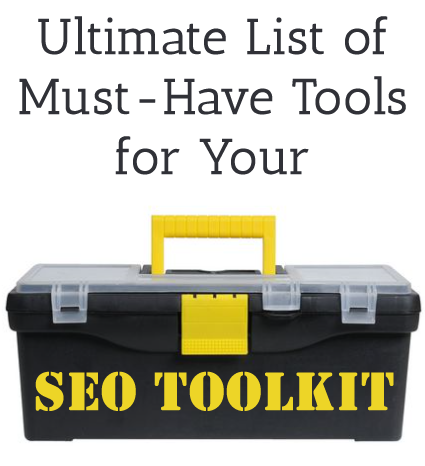They say that a carpenter is only as good as his tools, I would argue that in many ways the same can be said for SEOs. While personally I avoid tools that attempt to tell me how to optimize a site, (like somehow a site I’m working on and Wikipedia should be measured by the same yardstick) there are tools out there that make the data collection side of SEO dramatically more efficient and if you can get more done in less time, that makes you a better SEO.
So to that end I thought, what better area to cover in this my first article on TheSEMPost.com. While I admittedly I use probably 100 or more different tools for various things, I’m going to keep this list at a more reasonable 14 (because that’s the number that are both critical and not internally developed). I’ll be generating this list based on the frequency of access, not necessarily importance relativity but based on what the task is.
14 Critical SEO Tools In My Kit

This Firefox extension is easily my most used tool. It’s great for quickly pulling core metrics (index pages, PageRank, etc.) from either one site or all the sites on a results page. It also allows you to have a line through any links on a page that are no-followed for easy identification. There are tools in the link area that I may view as more critical in that the data accumulation would be more time consuming but I thank my lucky stars for this one.
Skill Level: Beginner

It had to be included though everyone reading this is likely already familiar with it. Keyword Planner is, for those who don’t know, Google’s AdWords tools to provide search volume estimates and keyword ideas. Essentially, this is the tool for keyword research and I love it for finding content ideas.
Skill Level: Beginner

Definitely my go-to link tool when I want to compare a site with its competitors or pull link data quickly on a site I don’t have Webmaster Tools data for. Their Clique Hunter is my most used tool.
Skill Level: Intermediate

Speaking of Webmaster Tools, this Google property may be even more important than Analytics (tight race there). Giving you access to keyword metrics for your site as well as crawl errors and (my favorite part) a list of pages producing 404’s as well as the links to them. This is the easiest and best place to find the pages linked to externally that no longer exist. Make sure to redirect the pages with incoming links.
Skill Level: Beginner

Historically I’ve used this toolset to look back in time at rankings (organic and paid) as well as research competitor’s keywords. They’ve recently added an excellent backlink tool based on this historical ranking information that is very impressive and provides data unavailable elsewhere.
Skill Level: Intermediate

A pretty basic link check tool you enter your starting URL and set it loose. At the end it provides you a list of all the broken links on your site (as well as a few other report options). Quick, easy and free.
Skill Level: Beginner

When you want to know what your traffic is doing and where it’s going on your site, Analytics is the tool for the job. It’s my personal favorite of all the Analytics programs I’ve worked with (paranoia aside from giving Google my data).
Skill Level: Beginner to Expert

Page speed is important, of that there is no question. It’s a known factor in rankings and improved visitor experience. With Insights, Google provides feedback on where your site slows down, grades it and provides information on solutions.
Skill Level: Expert

Another crawler but with more options than Xenu (which is why it costs money). It does have a 500 URL free version so great for smaller sites but for larger, well worth the ~$200/yr.
Skill Level: Intermediate

Another Firefox extension, this one enables you to select sections of a page, see the code for it in a frame as well as generate a list of the style elements that apply to it. Firebug has to be tried to fully grasp its power along with its critical yet quick troubleshooting; especially when dealing with CMS.
Skill Level: Intermediate

Another backlink reporting tool. While personally I like to pull from multiple sources and combine the data, that’s not in everyone’s budget or desire. Given that I have access to both tools, I often head to ahrefs when looking for a very simple breakdown of a site’s links (how many are .edu, etc.) and Majestic if I know I’m going to want to compare two or more sites. Both tools do essentially the same things with different datasets and presentation. If you’re going to pick one, then review both and see which you like better and which link datasets are larger in your industry.
Skill Level: Intermediate

A great set of domain-based tools for letting you know information regarding servers or just knowing what other domains a competitor owns.
Skill Level: Intermediate

Any SEO tools list needs to include Moz. While admittedly I don’t use all the tools in their toolset and even in their campaigns I’m hesitant to give Analytics access to any client or Beanstalk property to a 3rd party,the crawl data they provide is very helpful – especially on larger sites. I generally find their backlink analysis solid, but the backlink database is lacking compared to either Majectic or ahrefs. So if you have Moz you’ll still want to look at one of the other tools for link information, but Moz does a great job at onsite issue listing
Skill Level: Beginner

Analytics is great for letting us know what pages visitors went to, but CrazyEgg takes it one step further and tells you where specifically on a page a user clicks. This tool provides invaluable information for improving page layouts and even buttons and images. It can also tell you where people are trying to click in the event that it’s not a link on your page but looks like one. A great tool and well worth the whopping $9/mth a basic plan costs.
Skill Level: Intermediate
Honorable Mentions
On top of this there are a few tools that I wouldn’t list as crucial but which make life a little easier. And they are …

Great for checking old versions of sites to see what they looked like in the past.

Now that titles are no longer a set character count but rather are determined by pixels it’s great to have a tool that will let you test yours and see if it’ll fit in the result. Fortunately Dr. Pete over at Moz built just that.
I Welcome …
Any discussion or questions on these tools or feel free to list any you find extremely helpful. I also welcome any suggestion on the subject of my next article. I’ll be sticking primarily to organic SEO and link building, so feel free to let me know if there are topics you’d love to see covered.

Chip Jones says
One tool I like to use when I’m checking on Google SERP listings is the Google Advanced Search tool at http://www.google.com/advanced_search. Many SEOr’s may know the search parameters by heart, but this is a great tool for beginnners and one…
Fabien says
nice list lacks semrush.com
Terry Van Horne says
Please can we make a distinction between what is displayed in the results and what is indexed…because that is really what matters as far as ranking goes! Pixel width is useless figuring out that:
A. Google will index all of your title whether it is X pixels wide (to test make a title over 83-85 chars and do not include the rest in the page! You’ll find that Google still counts/indexes the words as in the page. Use the allintitle search to ascertain what is indexed and weighted for ranking in the results. If you are optimizing titles to 70 characters you have wasted 15% of the weighted title!